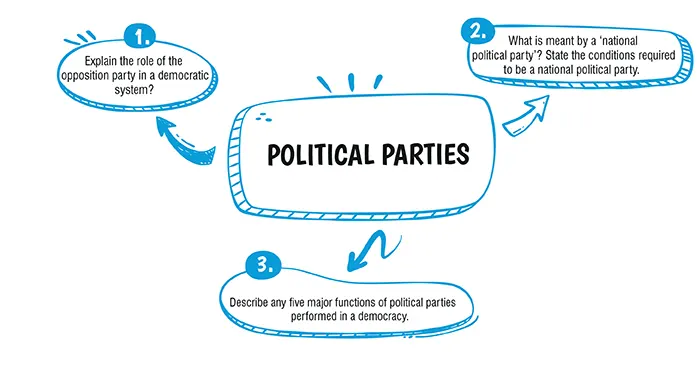Home / Boards / CBSE / Important Questions / Class 10 / Social Science / Political Parties
Table of Contents

Ans. (c)
Explanation:
The United States of America and U.K. are examples of two-party systems..
Ans. (d)
Explanation:
There are three main components of a political party:
Leader,active members and followers.
Explanation:
1. The strength of a democracy depends to a great extent on the constructive role of the opposition.
2. To check the government from becoming authoritarian and restrict its power, the opposition parties keep a watch over them.
3. The main duty of the opposition party is to criticise the policies of the government and also check the expenditure of the government.
Explanation:
A party that secures at least six per cent of total votes in Lok Sabha elections or Assembly elections in four states and wins at least four seats in the Lok Sabha is recognised as a national party.
A political party is called a national party if :
(i) It secures at least six per cent (6%) of the valid votes polled in any four or more states, at a general election to the House of the People or, to the State Legislative Assembly;
(ii) In addition, it wins at least four seats in the House of the People from any State or States.
Explanation:
Functions of Political Parties :
(i) Candidates are put forward by political parties to contest elections. These candidates may be chosen by the top leaders or by members of the party. In some countries like the USA, members and supporters of a party choose its candidate.
(ii) Parties put forward their policies and programmes for voters to choose from them. A government is expected to base its policies on the line taken by the ruling party (Political party then runs government).
(iii) Political parties play a major role in making laws for the country. No law can become a bill unless majority parties support it.
(iv) Political parties provide people access to government machinery and welfare schemes. It is easier for the public to approach their local party leader than a government officer. The local party leader has to listen to the public demand, otherwise people can reject them in the next elections.
(v) Parties shape public opinion. They raise and highlight issues. Parties sometimes also launch movements for the resolution of the problem faced by the people.
| Chapter No. | Chapter Name |
|---|---|
| History | |
| Chapter 1 | The Rise of Nationalism in Europe |
| Chapter 2 | Nationalism in India |
| Chapter 3 | The Making of a Global World |
| Chapter 4 | The Age of Industrialization |
| Chapter 5 | Print Culture and the Modern World |
| Geography | |
| Chapter 6 | Resources and Development |
| Chapter 7 | Forest and Wildlife Resources |
| Chapter 8 | Water Resources |
| Chapter 9 | Agriculture |
| Chapter 10 | Minerals and Energy Resources |
| Chapter 11 | Manufacturing Industries |
| Political Science | |
| Chapter 12 | Power – sharing |
| Chapter 13 | Federalism |
| Chapter 14 | Gender, Religion and Caste |
| Chapter 15 | Political Parties |
| Chapter 16 | Outcomes of Democracy |
| Economics | |
| Chapter 17 | Development |
| Chapter 18 | Sectors of the Indian Economy |
| Chapter 19 | Money and Credit |
| Chapter 20 | Globalization and The Indian Economy |
Ans: A one-party system is not considered a good option in a democratic system because voters are not offered any choice at the time of voting. This is not a democratic option. Any democratic system must allow at least two parties to compete in elections and provide a fair chance for the competing parties to come to power.
| Chapter Wise Important Questions for CBSE Board Class 10 Political Science |
|---|
| Power – sharing |
| Federalism |
| Gender, Religion and Caste |
| Political Parties |
| Outcomes of Democracy |
CBSE Important Questions Class 10
ICSE Important Questions Class 10
CBSE Important Questions Class 10
ICSE Important Questions Class 10